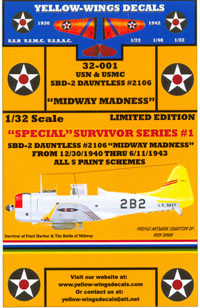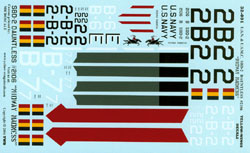Yellow Wings Decals 1/32 SBD-2 Dauntless #2106
|
 |
When this sheet showed up, I had just received the Cutting Edge 1/32
Corsair decals. I chuckled at how difficult those 1/32 modelers have it,
as their subjects are so big that aftermarket decal manufacturers can’t
put more than one aircraft on a sheet. But when I dove into this sheet,
I realized that, while this is only one aircraft, it is a complete life
history of that plane, with no less than five different schemes portrayed.
This one plane has an incredible history, starting from operations from
one of the first US aircraft carriers and ending up at the bottom of Lake
Michigan.
 This
sheet starts out with this plane decked out in its colorful prewar yellow
wing phase in early 1941. Flying off of the USS Lexington, it had a yellow
tail and the top half of the cowling was red. The plane carried the code
2B2 on the fuselage in black. In mid-1941, the plane was repainted in
non-specular gray, with small fuselage roundels and the 2B2 code painted
in white. In late 1941, this plane was again repainted, this time into
the standard blue-gray over light gray, with the colorful red and white
striped rudder and large national insignia. While wearing this scheme,
this plane was left behind in Hawaii for engine repair. It was at Ford
Field on December 7, 1941, and survived the Japanese attack. This plane
then returned to the Lexington and fought in some of the early battles
of the Pacific, returning to Pearl Harbor in April of 1942 for reassignment.
A good thing, too, as the next trip of the Lexington was fatal, lost at
the Battle of Coral Sea. This plane, instead, went to Midway Island, where
it had the red and white rudder painted out, and the red centers of the
national insignia painted out. It survived Midway (barely) and returned
stateside in 1943 for use in a Carrier Qualification Training Unit out
of Glenview, Illinois. Freshly repainted, this time the plane carried
the fuselage code B-7 and the name “Midway Madness” on the
nose. After surviving combat from the beginning of the war, the plane
survived just a few months before stalling out and crashing into Lake
Michigan, where it sank to a depth of 170 feet. It remained there until
1993, when it was recovered for the National Museum of Naval Aviation. This
sheet starts out with this plane decked out in its colorful prewar yellow
wing phase in early 1941. Flying off of the USS Lexington, it had a yellow
tail and the top half of the cowling was red. The plane carried the code
2B2 on the fuselage in black. In mid-1941, the plane was repainted in
non-specular gray, with small fuselage roundels and the 2B2 code painted
in white. In late 1941, this plane was again repainted, this time into
the standard blue-gray over light gray, with the colorful red and white
striped rudder and large national insignia. While wearing this scheme,
this plane was left behind in Hawaii for engine repair. It was at Ford
Field on December 7, 1941, and survived the Japanese attack. This plane
then returned to the Lexington and fought in some of the early battles
of the Pacific, returning to Pearl Harbor in April of 1942 for reassignment.
A good thing, too, as the next trip of the Lexington was fatal, lost at
the Battle of Coral Sea. This plane, instead, went to Midway Island, where
it had the red and white rudder painted out, and the red centers of the
national insignia painted out. It survived Midway (barely) and returned
stateside in 1943 for use in a Carrier Qualification Training Unit out
of Glenview, Illinois. Freshly repainted, this time the plane carried
the fuselage code B-7 and the name “Midway Madness” on the
nose. After surviving combat from the beginning of the war, the plane
survived just a few months before stalling out and crashing into Lake
Michigan, where it sank to a depth of 170 feet. It remained there until
1993, when it was recovered for the National Museum of Naval Aviation.
This sheet provides just about everything you need to make any one of
these aircraft. The only thing that are missing are the national insignia
(which are available on another Yellow Wings decal sheet) and the rudder
stripes. For those ambitious people, you could pick up five Trumpeter
SBDs and build the entire series, making for a very impressive (and large!)
collection of a famous aircraft. The decals are well printed and, like
other Yellow Wing releases, should go down quite nicely.
|
|
